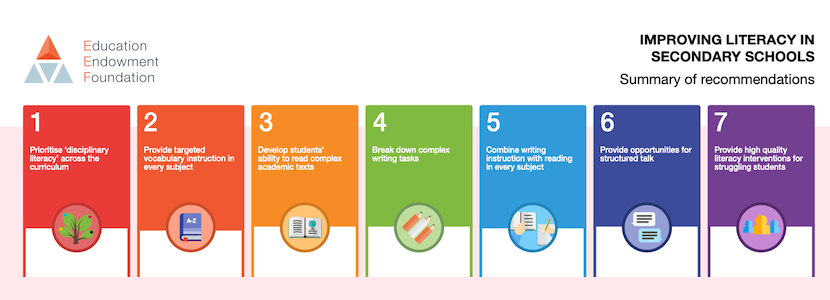
Literacy is a fundamental skill for success in school and later life. Students who struggle with literacy face challenges across all subjects and may struggle to access the challenging academic curriculum in secondary school. ReadingWise is an online literacy intervention programme. It is designed for primary and secondary schools that aims to rapidly improve reading outcomes. The programme makes delivery as simple and efficient as possible for busy teacher.
With over a decade working in secondary schools in England and delivering hundreds of thousands of programmes and studies completed with Cambridge University and the Department for Education, the ReadingWise offer is deep and sophisticated. The programme aligns perfectly to the Education Endowment Foundation (EEF) guidance for improving literacy in secondary schools.
This blogpost will explore how ReadingWise aligns to these EEF recommendations:
- Recommendation 1: Prioritise ‘disciplinary literacy’ across the curriculum.
- Recommendation 2: Provide targeted vocabulary instruction in every subject.
- Recommendation 3: Develop students’ ability to read complex academic texts.
- Recommendation 6: Provide opportunities for structured talk.
- Recommendation 7: Provide high quality literacy interventions for struggling students.
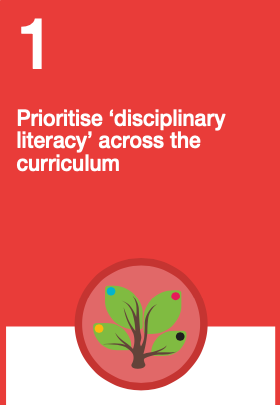
EEF Recommendation 1: Prioritise ‘disciplinary literacy’ across the curriculum
Disciplinary literacy is an approach to improving literacy that recognizes the unique language and conventions of different subjects. The EEF guidance stresses the importance of subject-specific support and encourages teachers in every subject to explicitly teach students how to read, write, and communicate effectively in their discipline. ReadingWise supports this approach in three key ways:
- By providing students with opportunities to engage with subject-specific vocabulary through the Vocab module;
- By giving schools the opportunity to bespoke and target the vocabulary from over 23,000 words in the ReadingWise dictionary;
- By giving schools quick and easy oversight into progress and completion by class, year group, school, or cohort.
Vocab allows a school to focus on tier 2 and/or tier 3 words. Disciplinary words are frequently tier 3 words encountered in a specific subject but may be unfamiliar to students. Teachers may explicitly teach these words, but Vocab makes tracking and reinforcing these words easy.
In short, Vocab helps students to develop the vocabulary they need to succeed in different subjects.
"ReadingWise has been a game changer at our school with regards to how we’re supporting students’ literacy, due to the variety of different
functions it has."
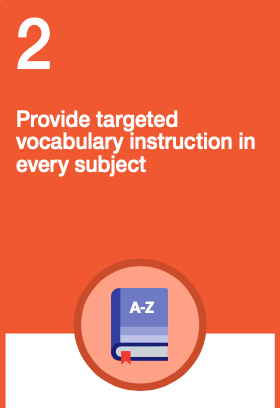
EEF Recommendation 2: Provide targeted vocabulary instruction in every subject
The EEF guidance recommends that teachers in every subject provide explicit vocabulary instruction. As described above, Vocab makes this easy.
The EEF recommendation also suggests that "teachers and subject leaders should consider which words and phrases to teach as part of curriculum planning." The Vocab module allows a literacy coordinator or head of English to define targeted word lists aligned to their curriculum that students and embed them in the Vocab module. So, as new words are introduced in class, these words are reinforced at the same time outside of class in an effective and efficient way.
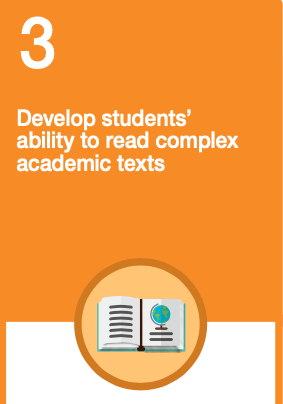
EEF Recommendation 3: Develop students’ ability to read complex academic texts
The EEF guidance highlights the challenges students face when reading complex academic texts. It highlights several suggestions, including:
- "To comprehend complex texts, students need to actively engage with what they are
reading and use their existing subject knowledge;" - "Reading strategies, such as activating prior knowledge, prediction and questioning can
improve students’ comprehension;" - "Strategies can be introduced through modelling and group work, before support is gradually
removed to promote independence;"
ReadingWise aligns to these recommendations through the Comprehension module, a small-group intervention. Comprehension develops strategies to navigate texts. These strategies include activating prior knowledge, making predictions, asking questions and supporting inference.
By explicitly teaching these strategies and providing opportunities to practice them, Comprehension helps students to develop the skills they need to become strategic and confident readers.
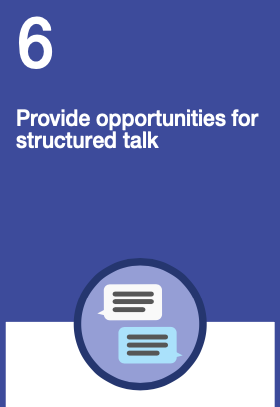
EEF Recommendation 6: Provide opportunities for structured talk
The EEF guidance emphasizes the importance of structured talk in the classroom. It suggests using frameworks like “accountable talk” to ensure talk is high quality and subject-specific. Accountable talk encourages students to be accountable to knowledge, reasoning, and community. The Comprehension module provides opportunities for structured talk by incorporating collaborative learning activities which we call 'Discussion.'
During these discussion activities, students can discuss their understanding of texts, share ideas, and clarify their thinking. Additionally, the module provides opportunities for students to engage in metacognitive talk, reflecting on their learning process and identifying strategies to overcome challenges. By providing structured opportunities for talk, Comprehension helps students to develop their communication skills and deepen their understanding of the subject matter.
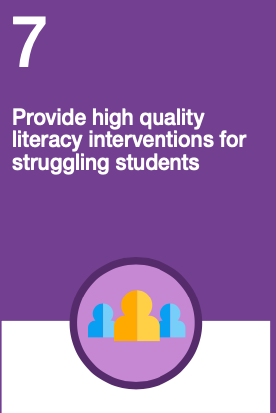
EEF Recommendation 7: Provide high quality literacy interventions for struggling students
The EEF guidance acknowledges that some students may require additional support to improve their reading. It recommends developing a model of tiered support, using assessment data to match students to appropriate interventions, and monitoring the impact of these interventions. One example of this being delivered effectively is with our partners Star Academies, where all 28 secondary schools use ReadingWise Vocab, Decoding and Comprehension to cohorts identified through NGRT assessment data.
Our interventions are high-quality, with Department for Education-funded gold standard randomised controlled trial evidence demonstrating efficacy. The tiered support allows schools to effectively target students struggling with decoding or comprehension.
All ReadingWise programmes provide detailed progress-tracking reports, which are valuable for monitoring student progress and informing movement within the different intervention efforts. By providing a comprehensive and adaptable intervention programme, ReadingWise allows a secondary school to deliver a unified, coherent literacy programme to improve reading outcomes.
Conclusion
ReadingWise is a set of online literacy intervention programmes that deliver on the EEF guidance for improving literacy in secondary schools. By focusing on disciplinary literacy, targeted vocabulary instruction, strategies for comprehension, structured talk through discussion, and high-quality interventions for struggling students, ReadingWise equips secondary schools with a unified, coherent, tried-and-tested approach to improving literacy outcomes.
Next Steps
Our team have worked with hundreds of schools like yours. We are well positioned to offer guidance and explore how we might help you improve reading outcomes in your secondary school.
To arrange a conversation, please use our demo link which can be accessed here or via the button below.
Thank you for your interest and we hope to hear from you.









